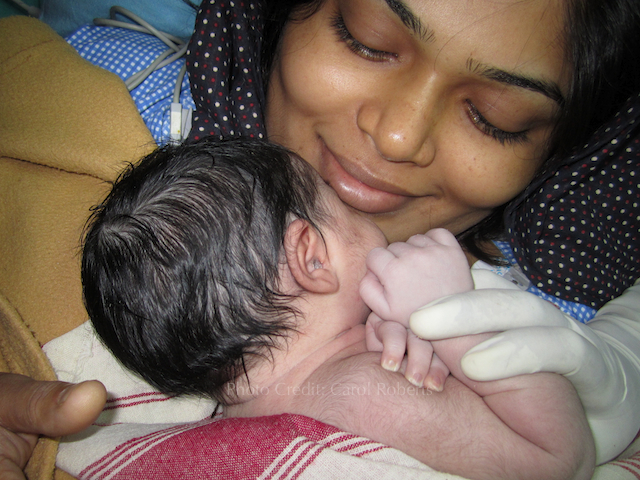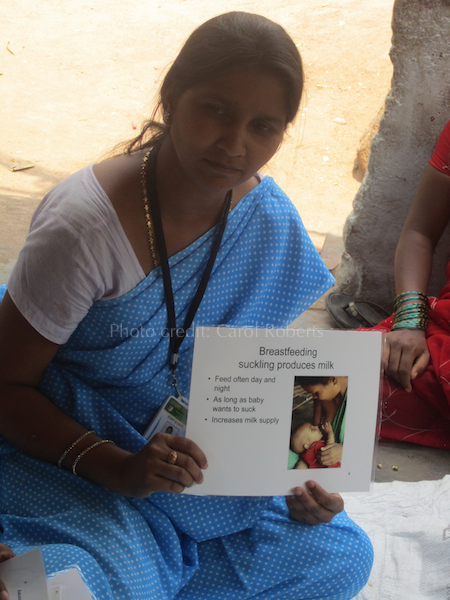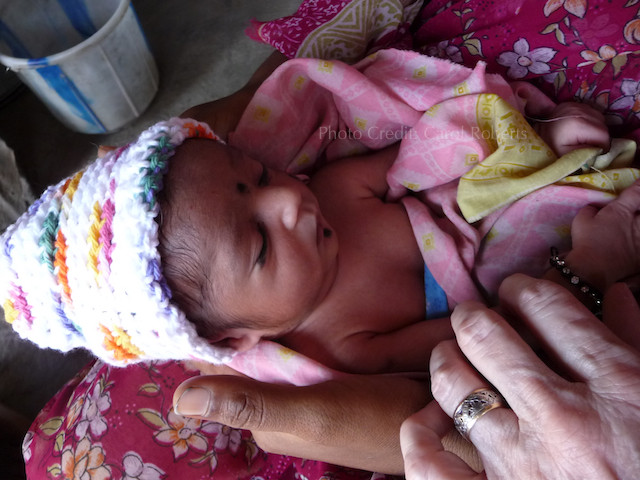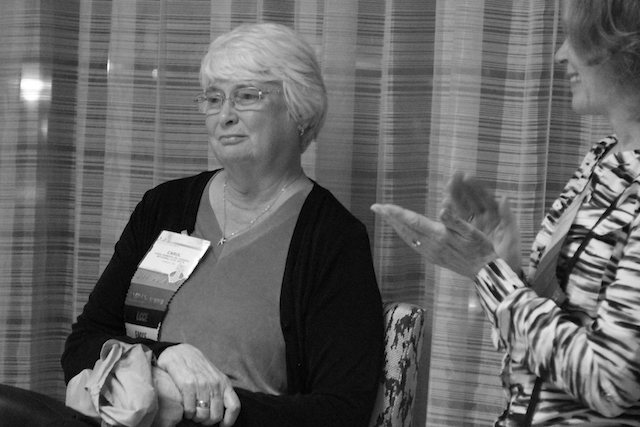
Carol Roberts – a Doula’s Perspective of Birth in India
I started the “Who BEcomes A Doula?” Series because I wanted know more about what compels a woman (or a man) to become a birth doula?
~Who is drawn to this work and what kind of work (or life) did they have before they became a birth doula?
~What makes them continue?
~Is there something about our personalities that leads us to find a way to connect with, care for and support women at that uniquely vulnerable and joyous time of birth?
~Does it matter what part of the country, or the world we live in or is it in our human DNA to do this work regardless of country and culture?
~And for fun, some questions and photos that give us a glimpse into the moments and meanings in their lives.
For this project, I have chosen to interview doulas all over the world. Some are new to this work. Some are seasoned and ‘reasoned’ – my way of saying they have found what it takes to make this work sustainable – both professionally and personally. All of them inspire me in my own “heart’s work”, like…doula, Carol Roberts.
Carol, I know you spent several years in India, would you tell us some more about that? Sure but I am speaking from the perspective ONLY of my experience in a segment of society that is rarely experienced by westerners. My words should NEVER be considered true of all of India!
Thank you for that reminder. We will remember to have cultural humility as we read your words. What took you to India? I was invited by an Indian doctor/friend to help in a health teaching program. I went as a Health Care Consultant to help the NGO with training of Community Health Workers for the rural poor of India. The majority of my five years was focused on bringing this education program forward both in quality and in caring for the hearts of those receiving medical care. I taught many topics regarding primary ways to improve health. My goal was to train Indian nurses to be health educators for Community Health Workers. Of course my favorite teaching was pregnancy, birthing and newborn! My favorite times were accompanying nurses I had trained into slums for on the spot mentoring. I treasured those moments of connecting heart to heart with the women in need myself. And of course teaching the nurses how to identify slum and village women who could be basic health teachers right in their own situation was a key. This elevated that woman’s position in her community and more readily spread news of better health practices.
After about 1 ½ years in India I was contacted by an Indian Obstetrician who owns three Woman’s hospitals. She asked me to come to her well respected primary hospital to consult in improving maternity care. Her goal was to bring more empowerment to the women. We became close friends and I admire her so much. I year later her hospital’s midwifery school was up and running to train her best OB nurses in this new profession. Midwives. UK midwives taught the midwifery skills. My role was to teach the segment on labor support skills and the crucial understanding of natural pregnancy and birth hormones and to mentor the students on the OB (GYNE) “ward”. My last year I also taught the second year students and first midwifery grads about pregnancy, birth and breastfeeding support in Indian villages and slums.
Did you attend any births while you were there? Yes but my role was more as a nurse educator not as a doula in almost all cases. I was blessed to see some women empowered with choices. Those choices seemed so minor considering their lack of choices regarding cesarean birth. I was thankful I could empower them to ask for some choices in spite of the cesarean birth. With great thanksgiving one mom was the “first“ for her doctor to allow skin to skin very soon after a cesarean as well as breastfeeding at that time. Seeing the doctors face when she observed this mother and baby was amazing. The mother had pre-eclampsia and legitimately had to birth early. Thus the doctor honored their request for skin to skin but said “baby will probably not feed because he is early”. Well this tiny baby was a major change agent. After watching this little guy content asleep and resting on mommy, warm as toast AND having fed at both breasts the Dr. said, ”we must do this for all babies”. This mom went on to tell everyone who would listen proudly, “I feed him right away.” Amazing what open hearts and minds can do.
My one totally natural, “empowering doula” birth was in a government hospital my first year in India I quietly spent hours with a first time mom whose daily existence was living in the streets. She was not allowed to have anyone present with her (none of the women were). We could share no words as she spoke Telugu. She understood my frequent “Accha Hai” – meaning “good” in Hindi but not any other Hindi words. Our hearts and hands and eyes connected and she accomplished birth with no exam and no interventions. My plastic bottle of water became her sole source of hydration. AND like not one other mother that day (at least 10-12 births) she sat upright part of labor, squatted briefly and pushed resting on her side. No one actually believed me at first when I indicated they needed to come for the baby’s birth. The mom’s smile, eyes and firm hand grip were all I needed to know she felt good about birth. I was fortunate to be in that hospital by invitation from a group of lay birth assistants in training from a group in Australia. They were there for a 3 month practical training. I was able to provide doula basics training to them the next year.
What did you find the biggest difference attending births in India vs the US? I am speaking from the perspective ONLY of my experience in a segment of society that is rarely experienced by westerners. My words should NEVER be considered true of all of India! Clearly our US birth culture differs from state to state. If you add India, state by state, each with a distinct culture – not just of birthing – but all outlook of life you MAY see the challenges. The women nor their family rarely would speak openly with questions to their doctor. They told me they feared the doctor would not take care of them at all if they asked questions. My role was not as a doula as much as a “GYNE nurse” as they called me. I tried to get the concept of doula understood but found there was way too much confusion. Thus I assumed a nursing role while trying to demonstrate doula skills. The huge gap in education in pregnancy and birthing for a large percentage of Indian women makes attending births there complicated.
What are some of the challenges faced by mothers in India? Lack of education, thus lack of meaningful employment, leading to lack of nutritional food and healthcare, Also the Indian patriarchal society often does not allow women to have any say in life choices. Women with slightly more education who felt a little more empowered would ask if I would speak for them. I explained and demonstrated in their homes how they could speak but often I assumed a nursing advocacy role on behalf of the client. At the same time I was demonstrating to the woman and family how they might ask question while still “honoring” the cultural appropriate high role of the doctor. I explained they could gather information and talk about their desires just as I did.
What memories have stayed with you – meaningful moments from your time there? Most memorable to me is empowering and loving the women of India. I am in touch with some of these women still and treasure our life-long connection.
You received the Penny Simkin Founder’s Award for Doula Spirit and Mentorship – how was that for you to be acknowledged for your efforts in promoting and caring for doulas and motherbabies? I was humbled beyond words to receive this award. I sat in my little room in India and cried tears of joy and sadness that I could not be present when this was announced. I so much missed my doula sisters at that moment. Truthfully it is hard for me to receive awards as every heart I am allowed touch I think is my greatest reward. To receive this award in the name of dear Penny Simkin was beyond special. It is a treasured forever moment. I finally received the actual award this year. Anni Grauer presented it to me with a group of DONA International doulas in Columbus Ohio. We both cried tears of joy.
Why/How/When did you become a doula? I became a doula before I knew what a doula was. With my first birth I only had experience with birthing with twilight sleep etc. During my obstetrical learning rotation in nurse’s training I supplemented what I observed with talking to an older cousin who had birthed naturally and reading her copy of Grantly Dick-Read’s Childbirth Without Fear: The Principles of Natural Childbirth. When I became pregnant with my first child in 1966 I was determined to surround myself with those who would believe me that I could and would birth as my body was created. Drugs was not in my birth plan. In 1966 that was not easily accomplished but I felt blessed to find an obstetrician in Colorado who said he didn’t know much about that but was really glad to help me birth this way. This empowering birth for me was a revelation. Not only of the power of my body but how I was transformed into being more confident and ready to face challenges. I had no doula and little support from my husband but my inner wisdom guided me all the way. Little did I know the first 3 days of bliss would be shattered five days after my dear Scott’s birth when he suddenly died due to a congenital heart defect. That in itself is another story. I do know his brief life gave me an additional incentive to help women be educated in natural birthing and empowered for changed lives.
I began my career in OB nursing soon after Scott’s death in early 1967. My first experience of OB nursing outside of nurses training was in the deep south of the US in an inner city hospital. I was not allowed to enter a labor room to “support the mother” as that was not considered my nursing role. Nor was she allowed to have family with her. My heart cried out to those dear women of color but I could not help them or work in that environment! I chose to work in the nursery where I could help some with mother and baby connections. Within a few months I was once again moving to a new location due to my husband’s work In Toledo, Ohio. There in 1968 I was fortunate to be able to work with a team to establish Family Centered Maternity Care. Part of my role was teaching Lamaze Childbirth Education and of course working as an OB Nurse. It was a natural transition in 1969 from education of expectant parents and then being requested to help them in birth. My first birth support efforts I knew nothing about special positions but I guided the woman to breathe as it worked for her. Thus I learned that loving and caring for the woman was what brought an empowering birth. I took a “new baby break” with births in 1971 and 1973. Four months after the birth of my 3rd son’s birth I began to teach Lamaze Classes in Medina, Ohio. There the desire for natural birthing skyrocketed and with it requests for going to labor and birth with couples. When I went to an education program about the research doula project newly completed in Cleveland I found out I was a doula. A fellow nurse and mom I had helped in birth attended the program with me. She turned to me during the presentation and said, “Carol that is what you have been doing you are a doula!”
SO I guess that is how I became a doula by name. I became a doula by heart way back in 1967. I became a doula by education through a training in Labor Support through Lamaze International taught by Kathy McGrath and then worked to became certified with the best – DONA International.
Why do you continue? I continue in doula work because of the realization that life is so much more meaningful to others as well as myself as I give my heart to serve. After my certification my goal was to provide Birth Doula support but at the same time educate as many of my fellow OB nurse and public as possible. The nurses jumped in and quickly provided amazing support to provide care way beyond medical aspects. I still love doing that today. At a birth yesterday (9-30-15) at a facility new to me I enjoyed the open nurses. I loved their questions, their ideas and after birth we shared. At their request I emailed them and a student nurse the PDF of Sara Buckley’s Hormone Physiology of Childbearing: Evidence and Implications for Women, Babies and Maternity Care. Thus I continue for the same purpose and goal. As it gets harder with age to provide as much Birth Doula support I can still provide education and support of others through mentoring.
Most surprising thing you ever took to/used (for yourself or the laboring woman) at a birth: a yellow flat stuffed duck with bright orange feet and bill with a massager in it’s belly. Mom’s always loved it! For cleanliness I placed it is a clear big plastic bag and sticking out from the bag was usually the feet or nose. It was not only a good gentle back massager but a REAL great giggle producer and thus relaxer of the mind too. The poor thing gave out as massager eventually but for years was a fixture in my living room/teaching room at home.
If you could say only one thing at a birth to the laboring woman, what would it be? I am so proud of your strength.
What is the most challenging thing about being a doula? The time restraints and always being on call that make it so important to be aware of balance between family and doula obligations
What is the most rewarding part of being a doula for you? Just being with the woman and family and seeing what a difference it has made – no matter the outcome I feel at peace about being there. No matter how tired I am or how challenging the birth I feel contended as I travel home.
We all understand the need women have to feel safe during childbirth and the value of a mother’s willingness to be vulnerable in her birthing time. We all feel vulnerable at some time.
Vulnerability is … allowing others to see your deep needs -joys and pain and struggles of life
How have you experienced the value of allowing yourself to be vulnerable as a doula? Yes I can relate better to the needs of the woman, her family and the team of healthcare professionals if I am open to all. I especially have allowed myself to be vulnerable when it comes to working with mom’s with neonatal loss.
Sometimes the “story I make up in my mind is”… I will have one more glorious birthing experience – all three of mine were a delight and growing for me as a woman. That birthing experience thought then turns to oh may I end my life journey with the strength God gave me for birthing my children.
Courage is… for me … trusting in God and leaving all things in His hands
How do you summon it? Prayer and Joy in resting with a peaceful heart and mind
Authenticity is… giving myself permission to be me and then acting on that truth
To recharge your Being, you… relax and pray, take a nature walk and take photos of the beauty
What question matters most to you? Where I will spend eternity
Anything else do you want/are you willing for us to know? Just to know that our children observe alot when they grow up as a doula kid! A lot about loving and caring for both them and birth families. Why adult son who I have observed as a birthing Dad reminds me of this. His calmness about birth and his natural knowing of what is needed amaze me. He doulas me when I am sick and in need. And yesterday without me asking he quietly showed up at the labor room to bring a small cooler with ice packs and good snacks for both the mom, dad and me. Because couple are dear friends his arrival was welcomed and appreciated. He never showed up at a doula birth growing up but he apparently was observing and learning of doula and mom needs. I tried for all the years to remember my family does come first before births. I also think my sons were learning of flexibility and commitment as they saw me balance work and family.
Your advice to new doulas – in HAIKU (or poem form) please
The time it takes
for hearts deeply connected
baby in arms, warmth, skin to skin
Silent heart treasures
The rose gently reminding
Pedals soften and thin before opening






